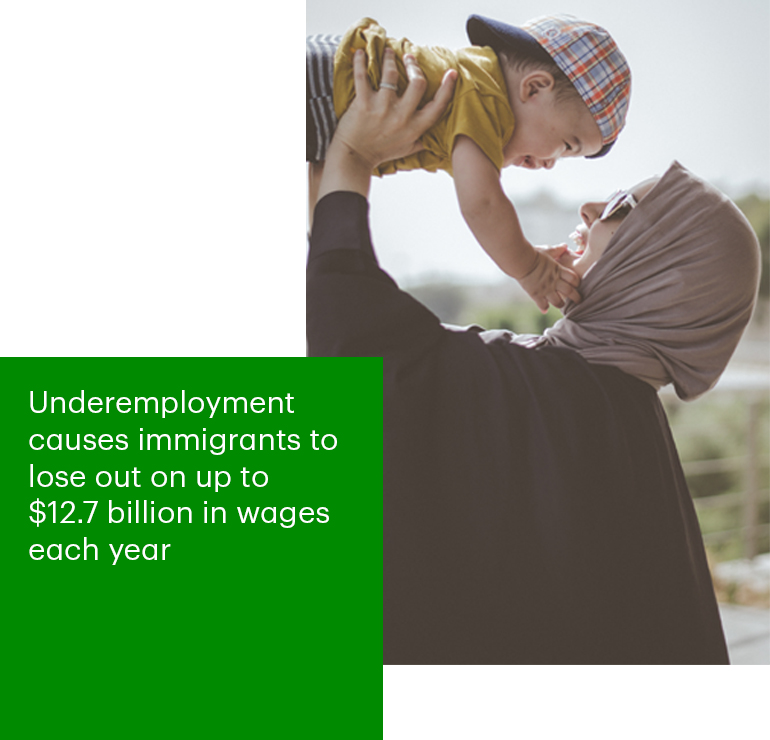When Charles first came to Canada from Nigeria in 2012, he arrived with more than 20 years of experience as a lawyer, but like so many internationally trained professionals, he lacked the required licenses to practice in Canada.
Determined to re-enter his profession, Charles took on a "survival job" as a security guard, a position he was overqualified for, to pay for his exams and support his family.
It soon became apparent to him that to succeed in acquiring the necessary credentials to practice law in Canada, he would need to dedicate more time to studying. However, if he reduced his hours at work, he would have a difficult time supporting his family and affording his exams.
Charles' situation is not unique. Every year, Canada attracts thousands of new immigrants who face similar challenges.
Thankfully, Charles was able to receive a loan from Windmill Microlending that helped cover the costs of his exam fees, enabling him to achieve his dream of being called to the Alberta Bar, and beginning his first job as a lawyer in Canada.
Windmill is one of 10 North American organizations that received $1-million in funding as part of the inaugural TD Ready Challenge grant, dedicated to addressing shifts in the labour force that are creating an urgent need to rethink skills development, increase income stability and nurture a more inclusive economy.
Newcomers to Canada face an assortment of barriers that lead to underemployment, including language proficiency, lack of professional networks, along with the expenses involved with immigration, settlement, job training and acquiring Canadian credentials when foreign work experience and credentials are not recognized.
READ: Helping new Canadians gain the financial confidence they need to reach their goals
With international migration accounting for nearly 80% of Canada's population growth from 2017-2018, underemployment of skilled immigrants has a wider impact on our economy. In fact, the Conference Board of Canada estimates that underemployment causes immigrants to lose out on up to $12.7 billion in wages each year. This loss not only impacts newcomers and their families, but the communities they support and Canadian economic productivity.
Through The Ready Commitment – TD's corporate social responsibility blueprint, which is designed to help open doors for a more inclusive tomorrow – TD is committed to supporting organizations that believe the economic and social inclusion of newcomers benefits us all.

Some of those organizations are specifically focused on assisting new immigrants like Charles, who are facing barriers to employment, to integrate into the Canadian job market, prosper, and achieve financial security.
Understanding the barriers many immigrants confront, TD aims to offer supports in a variety of ways through our people, business and philanthropy. In addition to The Ready Commitment, offering financial education programs, customized banking packages for new Canadians, service in over 240 languages and most recently a partnership with Tent Partnership for Refugees, TD is focused on understanding the immediate needs and issues refugees face.
Reskilling women in STEM
ACCES Employment – another of the 10 organizations that received a $1-million grant from The Ready Challenge – assists job seekers who are facing barriers to employment and helps them integrate into the Canadian job market. ACCES does this by providing employment services, linking employers to skilled people and building strong networks in collaboration with community partners.
Allison Pond, President and Chief Executive Officer of ACCES believes that one of the greatest barriers new immigrants face is the impact technology will have on the future labour market.
"With advancements in technology such as AI and robotics, we may not know exactly what the future labour market will look like," said Pond. "But we do know that digital literacy will be a critical skill for job seekers to attain in order to achieve success."
Most recently, ACCES has recognized the high-growth areas in STEM (science, engineering, technology and mathematics), and has created a program focused on providing immigrant women with training in programming, coding and cybersecurity.
"Traditionally, women are underrepresented in STEM, and immigrant women in particular face barriers to access jobs in this high growth field," said Pond. "We as an organization are looking to bring a much-needed technology training option to immigrant women that will make a significant impact on their lives."
The Women in Technology (WiT) initiative will work to provide training where participants will connect directly with hiring employers through a range of mentoring initiatives, guest speaker events and hands-on learning projects. Through this training, participants will develop essential technical and soft skills to help them achieve success in the fields of STEM.
Increasing income stability for skilled immigrants
An issue impacting the vast majority of Canadian immigrants and refugees, according to Paula Calderon, National Director, Client Success, Windmill Microlending, is that newcomers often struggle to resume their careers due to a lack of recognition for their education, skills, credentials and experience.
This often leads to under-employment in "survival jobs" because they cannot afford the cost of Canadian credentials or accreditation. Additionally, they are often unable to access credit in Canada because they have low income and no Canadian credit history.
READ: Meet the 2018 TD Ready Challenge grant recipients
Windmill aims to increase newcomer income stability through a program that provides low-interest loans of up to $10,000 to skilled immigrants, to fund the costs of training, books and materials, professional association fees, and Canadian credentials required to work in their field.
"As a Canadian charity looking to improve the employment outcomes of newcomers to Canada, we have a huge responsibility to ensure that our clients are successfully and gainfully employed," said Calderon. "And the grant from TD will support us in the development and the implementation of new tools and methodology that will allow us to better guide and support our clients towards a prosperous future."
Looking to the future
With the help of organizations like Windmill and ACCES, Charles was able to cover the costs of his exam fees, achieve his dream of being called to the Alberta Bar, and begin his first job as a lawyer in Canada.
But, as Canada remains a very attractive country for immigrants, reskilling and upskilling for the future will require collaboration between private, public and non-profit organizations. This challenge cannot be solved by one person, one company, one organization or one government.
Both Calderon and Pond agree that employers and organizations that are welcoming newcomers into the country need to work together to break the mold on traditional recruitment practices and tap into the wealth of talent new immigrants can provide.
"The support ACCES has received from TD has allowed us to grow a variety of initiatives and make a real difference in the lives of new Canadians," said Pond. "In fact, over the last 10 years TD has hired 700 individuals from our program, which is a true testament to the strength of corporate partnerships."
To help newcomers find meaningful, sustainable work, Calderon says we all have a responsibility to ensure the successful economic integration of immigrants.
"When immigrants, like myself, are able to integrate into the Canadian workforce, we can have very fulfilling and prosperous careers. Inclusion makes stronger, healthier communities that are better equipped to face a changing world and the challenges of the future."
The TD Ready Challenge is an annual North American initiative that has up to ten $1 million (CAD) grants available to catalyze innovative solutions for a changing world. The 2018 TD Ready Challenge problem statement focused on Financial Security and recipients were organizations that have scalable solutions to help open doors for a more inclusive and sustainable tomorrow.
This new signature initiative, created and funded by TD, is a key component to delivering on the bank’s new corporate citizenship platform, The Ready Commitment. To learn more, visit www.td.com/TheReadyCommitment.
